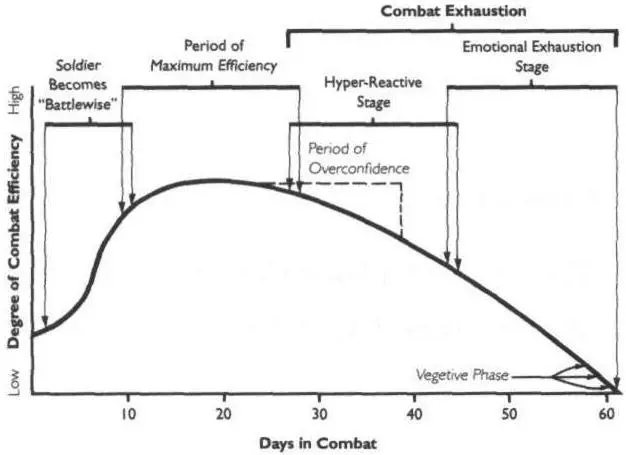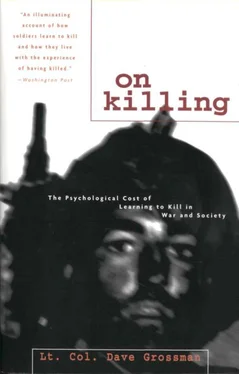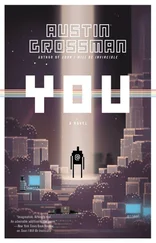In battle we see the id, the ego, the superego, Thanatos, and Eros in turmoil within each soldier. The id wields the Thanatos like a club and screams at the ego to kill. The superego appears to have been neutralized, for authority and society say that now it is good to do what has always been bad. Yet something stops the soldier from killing. What? Could it be that Eros, the life force, is much stronger than ever before understood?
Much has been made of the obvious existence and manifestation of Thanatos in war, but what if there is within most men a stronger drive than Thanatos? What if there is within each person a force that understands at some gut level that all humanity is inextricably interdependent and that to harm any part is to harm the whole?
The Roman emperor Marcus Aurelius understood this force even as he fought desperate battles against the barbarians who would ultimately destroy Rome. “Every individual dispensation,” wrote Marcus Aurelius, more than a millennia and a half ago, “is one of the causes of the prosperity, success, and even survival of. That which administers the universe. To break off any particle, no matter how small, from the continuous concatenation — whether of causes or of any other elements — is to injure the whole.”
Holmes records another veteran who, almost two millennia after Marcus Aurelius, grasped the same concept when he observed that some of the marines he was with in Vietnam reached a point of reflection after battle in which they “came to see the young Vietnamese they had killed as allies in a bigger war of individual existence, as young men with whom they were united throughout their lives against the impersonal ‘thems’ of the world.” Holmes then makes a timeless and powerful perception about the psyche of the American soldier when he notes that “in killing the grunts of North Vietnam, the grunts of America had killed a part of themselves.”
Perhaps this is why we avoid this truth. Perhaps to truly understand the magnitude of the resistance to killing is also to understand the magnitude of man’s inhumanity to man. Glenn Gray, driven by his own personal guilt and anguish resulting from his World War II experiences, cries out with the pain of every self-aware soldier who has thought this matter through: “I, too, belong to this species. I am ashamed not only of my own deeds, not only of my nation’s deeds, but of human deeds as well. I am ashamed to be a man.
“This,” says Gray, “is the culmination of a passionate logic which begins in warfare with the questioning of some act the soldier has been ordered to perform contrary to his conscience.” If this process continues, then “consciousness of failure to act in response to conscience can lead to the greatest revulsion, not only for oneself, but for the human species.”
We may never understand the nature of this force in man that causes him to strongly resist killing his fellow man, but we can give praise for it to whatever force we hold responsible for our existence. And although military leaders responsible for winning a war may be distressed by it, as a race we can view it with pride.
There can be no doubt that this resistance to killing one’s fellow man is there and that it exists as a result of a powerful combination of instinctive, rational, environmental, hereditary, cultural, and social factors. It is there, it is strong, and it gives us cause to believe that there may just be hope for mankind after all.
SECTION II
Killing and Combat Trauma:
The Role of Killing in Psychiatric Casualties
Nations customarily measure the “costs of war” in dollars, lost production, or the number of soldiers killed or wounded. Rarely do military establishments attempt to measure the costs of war in terms of individual human suffering. Psychiatric breakdown remains one of the most costly items of war when expressed in human terms.
— Richard Gabriel
No More Heroes
CHAPTER ONE
The Nature of Psychiatric Casualties:
The Psychological Price of War
Richard Gabriel tells us that “in every war in which American soldiers have fought in this century, the chances of becoming a psychiatric casualty — of being debilitated for some period of time as a consequence of the stresses of military life — were greater than the chances of being killed by enemy fire.”
During World War II more than 800,000 men were classified 4-F (unfit for military service) due to psychiatric reasons. Despite this effort to weed out those mentally and emotionally unfit for combat, America’s armed forces lost an additional 504,000 men from the fighting effort because of psychiatric collapse — enough to man fifty divisions! At one point in World War II, psychiatric casualties were being discharged from the U.S. Army faster than new recruits were being drafted in.
In the brief 1973 Arab-Israeli War, almost a third of all Israeli casualties were due to psychiatric causes, and the same seems to have been true among the opposing Egyptian forces. In the 1982 incursion into Lebanon, Israeli psychiatric casualties were twice as high as the number of dead.
Swank and Marchand’s much-cited World War II study determined that after sixty days of continuous combat, 98 percent of all surviving soldiers will have become psychiatric casualties of one kind or another. Swank and Marchand also found a common trait among the 2 percent who are able to endure sustained combat: a predisposition toward “aggressive psychopathic personalities.”

The Relation of Stress and Development of Combat Exhaustion to the Combat Efficiency of the Average Soldier
Source: Swank and Marchand, 1946
The British in World War I believed that their soldiers were good for several hundred days before inevitably becoming a psychiatric casualty. But this was only made possible by the British policy of rotating men out of combat for four days of rest after approximately twelve days of combat, as opposed to America’s World War II policy of leaving soldiers in combat for up to eighty days at a stretch.
It is interesting to note that spending months of continuous exposure to the stresses of combat is a phenomenon found only on the battlefields of this century. Even the years-long sieges of previous centuries provided ample respites from combat, largely due to limitations of artillery and tactics. The actual times of personal risk were seldom more than a few hours in duration. Some psychiatric casualties have always been associated with war, but it is only in this century that our physical and logistical capability to sustain combat has completely outstripped our psychological capacity to endure it.
The Manifestations of Psychiatric Casualties
In his book No More Heroes Richard Gabriel examines the many historical symptoms and manifestations of psychiatric casualties. [8] The information in this section has been taken largely from Gabriel’s No More Heroes, which in turn was taken largely from the Diagnostic and Statistical Manual of the American Psychiatric Association and from Military Psychiatry: A Comparative Perspective, an anthology that he edited.
Among these are fatigue cases, confusional states, conversion hysteria, anxiety states, obsessional and compulsive states, and character disorders.
This state of physical and mental exhaustion is one of the earliest symptoms. Increasingly unsociable and overly irritable, the soldier loses interest in all activities with comrades and seeks to avoid any responsibility or activity involving physical or mental effort. He becomes prone to crying fits or fits of extreme anxiety or terror. There will also be such somatic symptoms as hypersensitivity to sound, increased sweating, and palpitations. Such fatigue cases set the stage for further and more complete collapse. If the soldier is forced to remain in combat, such collapse becomes inevitable; the only real cure is evacuation and rest.
Читать дальше








